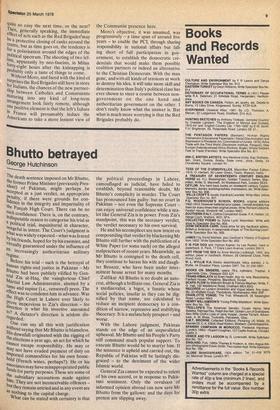Bhutto betrayed
George Hutchinson
The death sentence imposed on Mr Bhutto, !he former Prime Minister (previously President) of Pakistan, might perhaps be accepted as a just verdict, an appropriate Penalty, if there were grounds for confidence in the integrity and impartiality of the Punjab High Court. There can be no Such confidence. There is, on the contrary, Indisputable reason to categorise his trial as a Political trial, inquisitorial in character, vengeful in intent. The Court's judgment is What was widely expected —what was feared by his friends, hoped for by his enemies, and virtually guaranteed under the influence of an increasingly authoritarian military regime.
, Before his trial — such is the betrayal of adman rights and justice in Pakistan — Mr Bhutto had been publicly vilified by General Zia ul-Haq, the vainglorious Chief Martial Law Administrator, abetted by a tame and supine (i.e., censored) press. The effect was to condemn him in advance. Was the High Court in Lahore ever likely to Prove impervious to Zia's direction — for direction is what his invective amounted to? A dictator's direction is seldom disregarded.
One can say all this with justification Without saying that Mr Bhutto is blameless. His downfall originated with the rigging of the elections a year ago, an act for which he cannot escape responsibility. He may or may not have evaded payment of duty on Ported commodities for his own household (French wines, perhaps?). He or his associates may have misappropriated public funds for party purposes. These are some of the subsidiary accusations made against ,ahn. They are not inconceivable offences — Out they remain untried and in any event are as nothing to the capital charge. What can be stated with certainty is that the political proceedings in Lahore, camouflaged as judicial, have failed to establish, beyond reasonable doubt, Mr Bhutto's complicity in murder. The Court has pronounced him guilty: but no court in
Pakistan — not even the Supreme Court — can enjoy universal confidence while a zealot like General Zia is in power. From Zia's standpoint, this was the necessary verdict, the verdict necessary to his own survival.
He and his accomplices are now intent on compounding that verdict by blackening Mr Bhutto still further with the publication of a White Paper (or some such) on the alleged malpractices of recent years. Meanwhile, as Mr Bhutto is consigned to the death cell, they continue to harass his wife and daughter Benazir, who have been under intermittent house arrest for many months.
Zulfikar Ali Bhutto is no doubt an autocrat, although a brilliant one. General Zia is a mediaevalist, a bigot, a fanatic whose social policies, insofar as they can be dignified by that name, are calculated to reduce an incipient democracy to a condition of narrow, repressive and stultifying theocracy. It is a melancholy prospect — and worse.
With the Lahore judgment, Pakistan stands on the edge of an unparalleled upheaval. Mr Bhutto and his People's Party still command much popular support. To execute Bhutto would be to martyr him. If the sentence is upheld and carried out, the Republic of Pakistan will be lastingly disgraced — to the detriment of the wider Islamic world.
General Zia cannot be expected to relent of his own accord, or in response to Pakistani sentiment. Only the revulsion of informed opinion abroad can now save Mr Bhutto from the gallows: and the days for protest are slipping away.


































 Previous page
Previous page